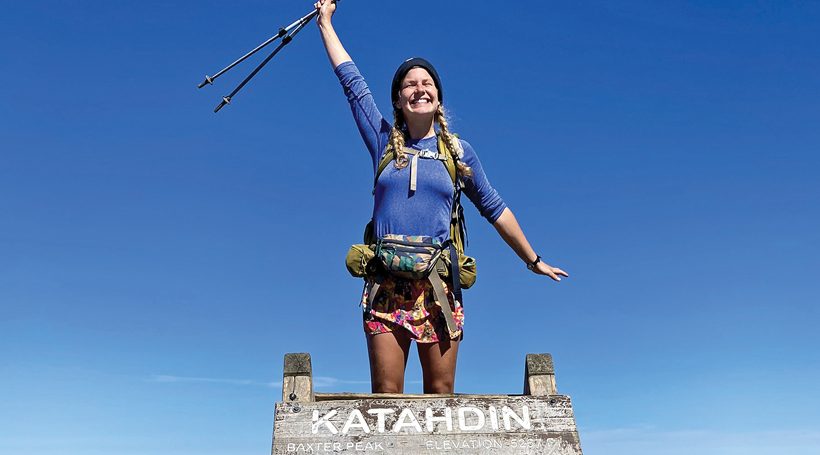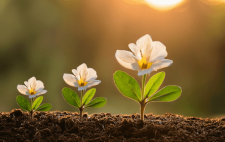Never before has 2 years seemed to go on forever. But we’ve all experienced it. We’ve all felt the pain, made the changes – adapted, pivoted and whatever other word describes turning our lives upside down. It’s been exhausting. But at the same time, many, many people have stepped back to take a breath, to look around, think and assess.
For many, this 2-year anniversary marks the beginning of a new day. They see clear skies ahead. And even though they’re nervous things may go terribly wrong again, they’re moving forward. Time has passed. Life is different. They’re still here. And they’re ready to reset.
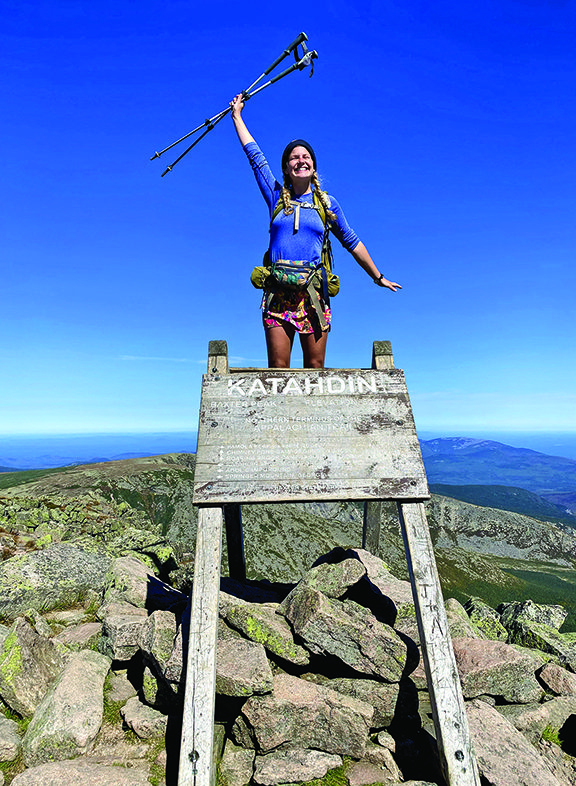
Alyssa Lukridge
Alyssa Lukridge
Four years out of college, Alyssa Lukridge was living according to her plan. She had a rewarding career as an oncology nurse, had a great apartment in the city and a wide circle of friends. And yet…the Moorestown native was restless.
“On paper everything added up,” says Lukridge, 27, “but I wasn’t happy.”
What exactly was missing? She couldn’t say. And although Lukridge had never so much as taken a serious hike, she kept having this feeling that nature would somehow help her figure it out. There was a book she had read some 20 years ago that stuck in her head. It was about a troubled girl who runs away from home and finds healing on the Appalachian Trail.
Maybe she would have ignored that feeling. But when she found out her friend from work, a fellow nurse, had read the same book and wanted to hit the trail, she took it as a sign. It gave her the courage to box up her belongings and put her career on pause. Joined by 2 old friends from Moorestown, they set out to backpack the entirety of the Appalachian Trail.
Two weeks into their adventure, the world was on lockdown. At first they were hearing from fellow hikers that conditions off the trail were worsening. When the actual shutdown occurred, it became clear they couldn’t continue. The dejected hikers turned back just 111 miles into the 2,190-mile trail.
Having quit her job at a time when nurses were in high demand, Lukridge realized she could go anywhere with her skills, so she decided to find a job where she could do the most good. She spent 2 months working in a New York City hospital slammed with Covid patients. When that stint ended, she decided on a whim to take a 6-month nursing job in Seattle to ride out the rest of the pandemic.
It was almost a year later when she finally returned to the trail. And although Lukridge felt absolute defeat when her first attempt on the trail ended after only 2 weeks, she eventually saw an upside. She returned to the trail with both a renewed appreciation for the opportunity and with a seed planted that she wasn’t done living on the West Coast.
Meeting fellow hikers, sleeping under the stars and spending long hours in her head while trekking really did solve her malaise, says Lukridge, who blogged about her 6-month adventure. After spending a few months at home in Moorestown, Lukridge returned to a nursing job in Seattle last month – something she never considered doing before the pandemic.
“When I first applied for my Washington state nursing license, it was nothing more than a leap of faith,” she says. “My time on the trail made me realize I have unfinished business here. I’m more comfortable doing something outside my comfort zone.”
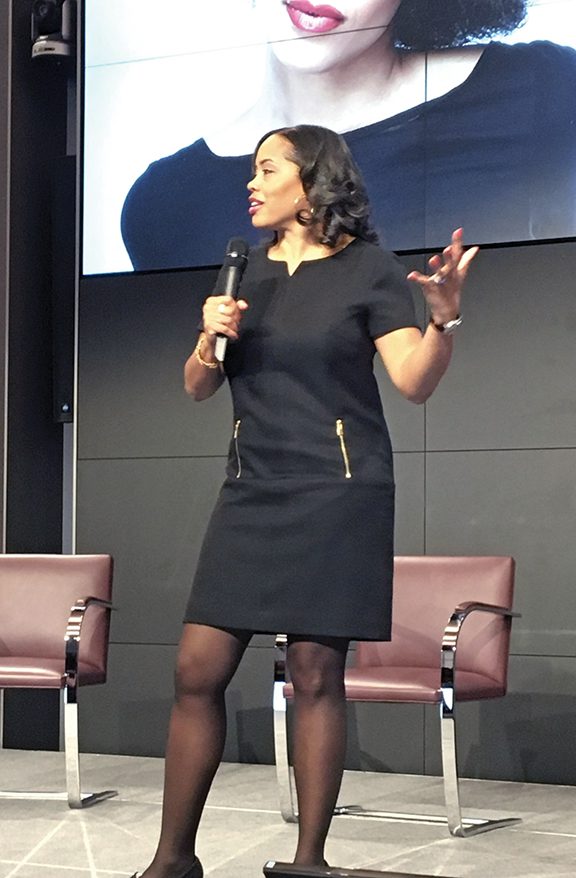
Michele Meyer-Shipp
Michele Meyer-Shipp
In March 2020, Michele Meyer-Shipp became the first woman and person of color to head human resources for Major League Baseball. Stepping into the role as the league’s first Chief People & Culture Officer, she was charged with leading all of MLB’s programs and initiatives related to workplace diversity, equity and inclusion – supporting all 30 major league clubs and 120 minor league clubs.
To say this was uncharted territory would be an understatement.
“I was hired at the height of the pandemic, in the height of a very charged racial justice environment, to help lead the organization through all of that, and I did,” says Meyer-Shipp, who worked remotely from her home, which soon became a full house when her 3 young adult sons returned to ride out the shutdown.
“It was more exhausting than any job I’ve ever had because of the crisis we were going through from a social justice standpoint and then add a pandemic on top of it,” she says. “It was straight up crisis management for an entire year. You’re carrying the weight of the world on your shoulders every day. And this was not unique to MLB.”
Meyer-Shipp saw MLB through the 2021 World Series and then announced she was leaving the organization. It was the first time in her life she left a job without having another one lined up. “Quite candidly, I needed to take time off. I’d done the work of being the person who rolls in to save the day. I needed to save my own day.”
Meyer-Shipp turned inward and also to a group of trusted mentors to figure out her next move. “I was looking back on pictures of every single place I’ve worked and realized some of the key moments that mattered most for me were working on programs supporting women, their advancement and recruiting,” she says.
With these ideas swirling through her head, she realized she was ready to leave corporate America. When recruiters came to her with the chance to lead Dress for Success, a global nonprofit that provides employment resources for women, she knew this was what she’d been looking for.
“This work is more important now than ever before in our lifetime,” she says. “The pandemic has dealt a devastating impact on women globally to the tune of $800 billion in lost income and set women back more than a decade in gains achieved in the workplace. This was a win-win proposition. The organization gets the best of me and all my skill sets, and I get personal fulfillment.”
Although it was tempting to dive in right away to make her mark, Meyer-Shipp negotiated a break for herself before starting last month.
“So I guess I am one of those people who took part in the Great Resignation as a result of the pandemic,” she says. “I found my moment of transformation. Life can’t just be about work, work, work.”
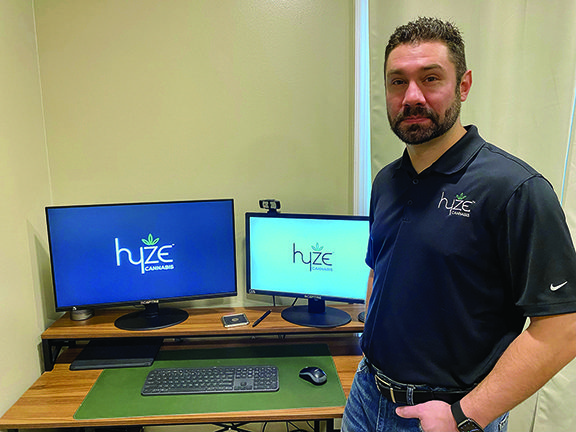
Shawn Coggan
Shawn Coggan
Like many people, Shawn Coggan was furloughed from his job in the early days of the pandemic. And again like many people, the time off got him thinking about life, work and what would come next.
Over time, the soul-searching became a little uncomfortable. After all, his life was pretty set before all this happened. He had a job in business development. He was engaged, and looking forward to the vision he had for his future. But now, there was an idea simmering that was both intriguing and terrifying to him.
“I always wanted to own my own business, but I’m a bit risk averse,” says Coggan, 38. “It had to be the right business if I was going to take a risk.”
Coggan started paying closer attention as the movement to legalize marijuana for recreational use gained momentum.
“I knew it was going to pass, and I also knew that there was a huge risk in getting into that business,” he says. “But I started to see this as a once-in-a-lifetime opportunity.”
Months before voters approved the referendum to legalize marijuana, Coggan pitched to his cousin the idea of opening a boutique dispensary in South Jersey. His cousin, who owns a deli/pizza restaurant in Edgewater Park, liked the idea, and the 2 began to brainstorm. What they developed was Hyze – a high-end marijuana dispensary. And since Coggan was out of a job, they decided he would devote himself to the start-up.
So for the past 2 years Coggan has been working on turning Hyze into reality. And he’s found it’s more complicated than he imagined. Although he’s had his paperwork ready to file for months, the state is not accepting applications until March 15. And pinpointing a location for the business is proving difficult, he says, as most municipalities are waiting for more direction from the state before allowing cannabis businesses into the fold.
“The hardest thing is working with all these unknowns,” Coggan says. “And there’s the mental strain of not earning a paycheck. It goes against every fiber of my being, but I’m starting to get excited now that it’s so close.”
“This is a chance to get into a multi-billion-dollar industry at the ground floor,” Coggan says. “And I’m ready.”

Fighting Resilience Fatigue
(so you’re ready for a reset)
The early days of the pandemic reminded Margaret Harbison, MD, of 2 other traumatic events: The aftermath of 9/11 and Hurricane Sandy, when so many were eager to make sure those around them were being cared for.
“Everyone was telling each other to stay safe. People were sharing tips on where to buy things like toilet paper. We rallied behind frontline healthcare workers, and there was just a sense that we were all in this together,” says Harbison, a psychologist with Centra in Marlton. “We were so positive in the beginning, but we’ve totally lost that sense of solidarity.”
What happened? We’ve entered a phase of the pandemic that some are calling resilience fatigue, the exhaustion that sets in after a prolonged period of having to stay motivated or positive.
“Resilience is work,” says Harbison. “It doesn’t just come to you. At the beginning, it was easier for people to counter the hard parts of the pandemic with gratitude. There were good things about working from home, getting to be with pets and kids, throwing a load of clothes in the laundry while working. But of course the goal posts of life going back to normal keep moving further back, and people are frustrated and tired of the pandemic.”
Harbison says it’s healthy to acknowledge that frustration. “We did lose our old way of life – all the graduations, weddings and birthday parties missed, it’s cumulative,” she says. “We should mourn those losses because they are real.”
At the same time, it’s important to counter the bad feelings by staying connected to people and things that bring joy.
“When we get stressed or overwhelmed, it’s easy to retreat, to isolate and to numb ourselves with distractions like social media, TV, drugs or alcohol,” Harbison adds. “It’s important to find comfortable ways to stay connected.”
Rowan University psychologist Jeffrey Greeson says a silver lining of the pandemic is that it has led many to mindfulness practices, such as meditation, and relaxing hobbies like crafting, cooking or yoga.
“It’s hard to keep positive if we don’t have some sort of daily practice or routine that allows us to become more self aware,” says Greeson, an assistant professor who runs the Mindfulness, Stress & Health Center at Rowan and studies the connections between mindful practices and health.
“Giving in to the stress and fear narrows our attention and awareness so we’re just focused on that, and it’s hard to see anything else,” he says. “Mindfulness practices do the opposite. It can help broaden our attention and awareness to deal with the chronic stress and losses of the past 2 years.”
Mindfulness and self care practices can start small, such as a walk outside in nature or setting aside a few minutes daily for quiet reflection.
“When you give yourself the opportunity to pay greater attention to the here and now, it can take you outside of the constant mode of stress and fear to make clearer decisions,” he says. “If you use this as a springboard for change, you’ll be ready for a reset.”


